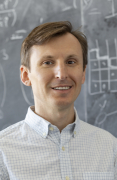Lecture Series
This page groups sessions by Lecture Series adding global information about the series when available.
Geometric approach to Quantum Hall Effect
Quantum Hall effect is well known physics experiment, featuring precise quantization of the Hall conductance in materials with imprecisely known characteristics. It is said to be one of the most striking examples of macroscopic manifestation of quantum phenomena.
One of the approaches to explain QHE is by constructing explicit N-particle wave functions, called Quantum Hall states. It was laid out and explored in the famous works of Laughlin, Haldane, Haldane-Rezayi, Wen-Niu, Avron-Seiler-Zograf and others. It became customary to study QH states analytically on geometric backgrounds, e.g. compact Riemann surfaces. This approach turned out to be unexpectedly fruitful, leading in particular, to the discovery of topological phases of matter, anyons, non-abelian statistics, topological quantum computing and much more.
I will review this approach and talk about the program to set this approach on a rigorous mathematical footing, and to prove various conjectures in the field. I will also talk about what in my opinion are the most exciting things to do going forward. The keywords for the lectures include holomorphic line bundles, Riemann surfaces, moduli spaces, Bergman kernel, determinant point processes, Coulomb gas, etc.
References
- R. B. Laughlin, Anomalous Quantum Hall Effect: An Incompressible Quantum Fluid with Fractionally Charged Excitations, Phys. Rev. Lett. 50, 1395 (1983).
- F. D. M. Haldane and E. H. Rezayi, Periodic Laughlin-Jastrow wave functions for the fractional quantized Hall effect, Phys. Rev. B 31, 2529 (1985).
- X. G. Wen and Q. Niu, Ground-state degeneracy of the fractional quantum Hall states in the presence of a random potential and on high-genus Riemann surfaces, Phys. Rev. B41, 9377 (1990).
- J. E. Avron, R. Seiler, and P. G. Zograf, Adiabatic Quantum Transport: Quantization and Fluctuations, Phys. Rev. Lett. 73, 3255 (1994).
- S. Klevtsov, X. Ma, G. Marinescu, and P. Wiegmann, Quantum Hall effect and Quillen metric, Commun. Math. Phys. 349, 819 (2017).
- S. Klevtsov, Laughlin states on higher genus Riemann surfaces, Commun. Math. Phys. 367, 837 (2019).
- S. Klevtsov and D. Zvonkine, Geometric Test for Topological States of Matter, Phys. Rev. Lett. 128, 036602 (2021).
Organizers
João Pimentel Nunes and José Mourão.
Support
CAMGSD UIDB/04459/2020 and UIDP/04459/2020.
Permanent link to this information: https://lagp.math.tecnico.ulisboa.pt/lecture_series?sgid=31
Move the mouse over the schedule to see start and end times.
/
16

